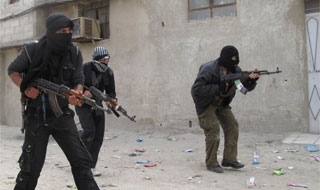
Beirut, April 2: Syrian government troops clashed with rebel forces across the country Monday as international envoy Kofi Annan prepared to brief the U.N. Security Council on the progress of his mission to ease the nation’s crisis.
A new flurry of high-level diplomacy has failed to stop the violence in a year-old conflict that the U.N. says has killed more than 9,000 people.
On Monday, more than 70 countries, including the United States, pledged to send millions of dollars and communications equipment to opposition groups inside Syria, signaling a growing belief that diplomacy and sanctions alone will not end the repression and push Syrian President Bashar Assad from power.
Participants at an international diplomatic conference in Istanbul on Sunday said Saudi Arabia and other Gulf countries are creating a fund to pay Syrian rebels fighters known as the Free Syrian Army and soldiers who defect from the regime. One delegate described the fund as a “pot of gold” to undermine Assad’s army.
Participants confirmed the Gulf plan on condition of anonymity because details were still being worked out. One said the fund would involve several million dollars a month. It is said to be earmarked for salaries, but it was not clear whether there would be any effort to prevent the money from being used to buy arms, an issue that could prompt stronger accusations of military meddling.
Anti-regime activists inside Syria welcomed the news, while worrying that the aid would be too little, too late.
“This is what we have been asking for, but if they had decided to do this months ago, we could have avoided a large number of martyrs,” said Fadi al-Yassin from the northern province of Idlib. “We know that there is no way to topple the regime without force.”
As the joint U.N.-Arab League envoy, Annan has been pushing a six-point plan to end the country’s crisis that includes an immediate daily two-hour halt to fighting so aid can reach suffering civilians. It also calls for an overall cease-fire so all parties can discuss a political solution.
Annan is scheduled to brief the U.N. Security Council in New York on his progress Monday.
The Syrian government has said it accepts his plan while rejecting some of the steps it requires, like withdrawing its troops from towns and cities. Its attacks on opposition areas have continued unabated.
The opposition has also rejected dialogue with the regime, saying it has killed too many people to be part of a solution to the crisis.
While international condemnation of Assad’s crackdown has grown, Russia and China have stood by Assad, twice protecting his regime from censure by the U.N. Security Council. Neither country accepted invitations to Sunday’s conference, dubbed “Friends of the Syrian People.”
On Monday, Russian Foreign Ministry spokeswoman Maria Zakharova criticized the meeting for not including the Syrian government and “many influential groups of Syrian opposition.”
In a statement, she said Annan’s plan — which does not call specifically for Assad to leave office — is the best way to settle the conflict and criticized the moves to help rebel forces.
“The statements and assurances about direct military and logistical support of the military opposition that have been made in Istanbul undoubtedly contradict the task of peaceful settlement of the Syrian conflict,” she said.
Syria also blasted the conference, saying in an editorial in the state-run al-Baath newspaper that the conference sought to “blow up and derail” Annan’s mission.
Violence continued in Syria Monday.
The Britain-based Syrian Observatory for Human Rights said three civilians, five rebels and one government soldier were killed in clashes in the northern Idlib province.
In the northern city of Aleppo, explosives stashed in a kiosk blew up, killing one person, the group said, while rebels in the south killed two soldiers at a checkpoint.
Government forces stormed the southern town of Dael, raiding activist homes and setting some on fire, the Observatory said. Another group, the Local Coordination Committees, said more than 20 homes had been damaged.
Residents could not be reached for comment and activists’ claims could not be independently verified. The Syrian government rarely comments on specific incidents and bars most media from working inside the country.
Syria’s uprising began in March 2011 as part of the Arab Spring with peaceful protests calling for political reforms. Assad’s regime sent tanks, snipers and thugs to try to quash the revolt, and many in the opposition have taken up arms to defend themselves and attack government troops.






Comments
Add new comment